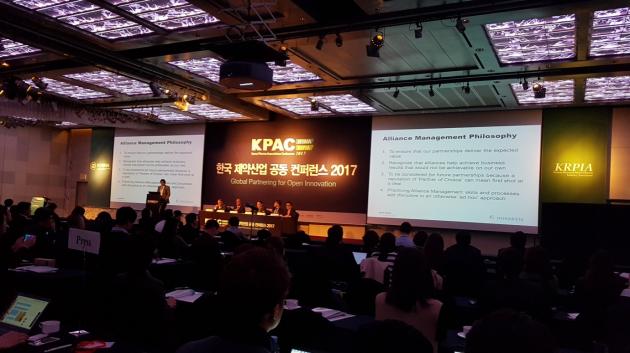Korean and foreign pharmaceutical companies got together at the Korea Pharma Association Conference (KPAC) held at Coex Tuesday to discuss open innovation strategies for sustainable growth in a rapidly changing, high-risk pharmaceutical market.
KPAC 2017, the third such annual event, kicked off its two-day run to promote international collaboration. Participants have formed about 50 new partnerships a year.

Korean Pharmaceutical Bio-Pharma Manufacturers Association한국제약협회(KPBMA) and Korea Research-based Pharmaceutical Industry Association한국다국적의약산업협회(KRPIA) cohosted the event.
KPBMA Chairman Won Hee-mok원희목 said in his congratulatory speech, “Korea’s pharmaceutical industry has progressed from producing only generic drugs to launching 27 home-grown products and exporting a significant amount overseas.”
Senior executives from eight major pharmaceuticals such as J&J, along with members from bio venture firms, government institutions, investment banks and consulting companies attended to network and share collaboration methods.
In the afternoon session, representative members from Sanofi사노피, Lilly릴리, Novartis노바티스, Dong-A ST동아ST, and Solidus Investment agreed on the importance of open innovation and partnerships.
“The time of doing everything in-house is over,” said Jean-Marie Arnaud, senior vice-president at Sanofi, head of Global Trade and Revenue Management. “We cannot do it alone. It’s important to have a network of partners to maximize results. Sanofi chose to enter Korea because the country excels in translational science, incremental innovation, and bioprocessing.”
Chae J. Lee이재준, senior vice-president of Dong-A ST Global Business headquarters, noted that Korean companies would face growing pains due to its relative lack of experience, size and scale compared to multinational corporations.
“By default, we can only achieve success through open collaboration and open innovation,” Lee said. “We are constantly looking for collaboration candidates – in 2016, we made six deals that represent Korea’s transformation from generics to biosimilar, incrementally innovative to entirely innovative, and late class drugs to first-in-class oncology drugs.”
Multinationals also cited the need to expand globally, with Joseph S. Camardo, senior vice-president at Celgene Global Healthy, saying, “We want to be where talent is, and partner with the best, bringing scientists and early clinical researchers together.”
Camardo added that it is no longer possible to predict which labs will produce the next innovative product since big businesses no longer control all the labs.
“Innovative products can come from Johns Hopkins or a hospital in Seoul. Korea has the chance to create the future of medicine,” Camardo said.

